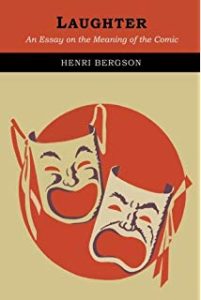II
Now let us see, in the light of what has gone before, the line to take for creating an ideally comic type of character, comic in itself, in its origin, and in all its manifestations. It must be deep-rooted, so as to supply comedy with inexhaustible matter, and yet superficial, in order that it may remain within the scope of comedy; invisible to its actual owner, for the comic ever partakes of the unconscious, but visible to everybody else, so that it may call forth general laughter, extremely considerate to its own self, so that it may be displayed without scruple, but troublesome to others, so that they may repress it without pity; immediately repressible, so that our laughter may not have been wasted, but sure of reappearing under fresh aspects, so that laughter may always find something to do; inseparable from social life, although insufferable to society; capable—in order that it may assume the greatest imaginable variety of forms—of being tacked on to all the vices and even to a good many virtues. Truly a goodly number of elements to fuse together! But a chemist of the soul, entrusted with this elaborate preparation, would be somewhat disappointed when pouring out the contents of his retort. He would find he had taken a vast deal of trouble to compound a mixture which may be found ready-made and free of expense, for it is as widespread throughout mankind as air throughout nature.
This mixture is vanity. Probably there is not a single failing that is more superficial or more deep-rooted. The wounds it receives are never very serious, and yet they are seldom healed. The services rendered to it are the most unreal of all services, and yet they are the very ones that meet with lasting gratitude. It is scarcely a vice, and yet all the vices are drawn into its orbit and, in proportion as they become more refined and artificial, tend to be nothing more than a means of satisfying it. The outcome of social life, since it is an admiration of ourselves based on the admiration we think we are inspiring in others, it is even more natural, more universally innate than egoism; for egoism may be conquered by nature, whereas only by reflection do we get the better of vanity. It does not seem, indeed, as if men were ever born modest, unless we dub with the name of modesty a sort of purely physical bashfulness, which is nearer to pride than is generally supposed. True modesty can be nothing but a meditation on vanity. It springs from the sight of others’ mistakes and the dread of being similarly deceived. It is a sort of scientific cautiousness with respect to what we shall say and think of ourselves. It is made up of improvements and after-touches. In short, it is an acquired virtue.
It is no easy matter to define the point at which the anxiety to become modest may be distinguished from the dread of becoming ridiculous. But surely, at the outset, this dread and this anxiety are one and the same thing. A complete investigation into the illusions of vanity, and into the ridicule that clings to them, would cast a strange light upon the whole theory of laughter. We should find laughter performing, with mathematical regularity, one of its main functions—that of bringing back to complete self-consciousness a certain self-admiration which is almost automatic, and thus obtaining the greatest possible sociability of characters. We should see that vanity, though it is a natural product of social life, is an inconvenience to society, just as certain slight poisons, continually secreted by the human organism, would destroy it in the long run, if they were not neutralised by other secretions. Laughter is unceasingly doing work of this kind. In this respect, it might be said that the specific remedy for vanity is laughter, and that the one failing that is essentially laughable is vanity.
While dealing with the comic in form and movement, we showed how any simple image, laughable in itself, is capable of worming its way into other images of a more complex nature and instilling into them something of its comic essence; thus, the highest forms of the comic can sometimes be explained by the lowest. The inverse process, however, is perhaps even more common, and many coarse comic effects are the direct result of a drop from some very subtle comic element. For instance, vanity, that higher form of the comic, is an element we are prone to look for, minutely though unconsciously, in every manifestation of human activity. We look for it if only to laugh at it. Indeed, our imagination often locates it where it has no business to be. Perhaps we must attribute to this source the altogether coarse comic element in certain effects which psychologists have very inadequately explained by contrast: a short man bowing his head to pass beneath a large door; two individuals, one very tall the other a mere dwarf, gravely walking along arm-in-arm, etc. By scanning narrowly this latter image, we shall probably find that the shorter of the two persons seems as though he were trying TO RAISE HIMSELF to the height of the taller, like the frog that wanted to make itself as large as the ox.

